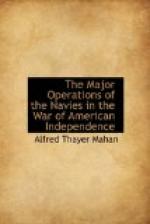On the 13th the allied fleets came out, being induced to quit their commanding position at Algeciras by fears for two of their number, which shortly before had been driven to the eastward. During the forenoon of the same day the British were off the Spanish coast, fifty miles east of Gibraltar. At sunset the allies were seen approaching, and Howe formed his fleet, but sent the supply-ships to anchor at the Zaffarine Islands, on the coast of Barbary, to await events. Next morning the enemy was close to land northward, but visible only from the mastheads; the British apparently having headed south during the night. On the 15th the wind came east, fair for Gibraltar, towards which all the British began cautiously to move. By the evening of the 16th, eighteen of the convoy were safe at the mole; and on the 18th all had arrived, besides a fireship with 1,500 barrels of powder, sent in by the Admiral upon the governor’s requisition. Throughout these critical hours, the combined fleets seem to have been out of sight. Either intentionally or carelessly, they had got to the eastward and there remained; having rallied their separated ships, but allowed Gibraltar to be replenished for a year. On the morning of the 19th they appeared in the north-east, but the relief was then accomplished and Howe put out to sea. He was not willing to fight in mid-Straits, embarrassed by currents and the land; but when outside he brought-to,—stopped, by backing some of the sails,—to allow the enemy to attack if they would, they having the weather-gage. On the following day, the 20th, towards sunset they bore down, and a partial engagement ensued; but it was wholly indecisive, and next day was not renewed. The British loss was 68 killed and 208 wounded; that of the allies 60 killed and 320 wounded. On the 14th of November the fleet regained Spithead.
The services rendered to his country by Howe on this occasion were eminently characteristic of the special qualities of that great officer, in whom was illustrated to the highest degree the solid strength attainable by a man not brilliant, but most able, who gives himself heart and soul to professional acquirement. In him, profound and extensive professional knowledge, which is not inborn but gained, was joined to great natural staying powers; and the combination eminently fitted him for the part we have seen him play in Delaware Bay, at New York, before Rhode Island, in the Channel, and now at Gibraltar. The utmost of skill, the utmost of patience, the utmost of persistence, such had Howe; and having these, he was particularly apt for the defensive operations, upon the conduct of which chiefly must rest his well-deserved renown.
A true and noble tribute has been paid by a French officer to this relief of Gibraltar:[135]—




